Polls and surveys
The DVDs of 2009
Our critics choose their favourite releases of the year
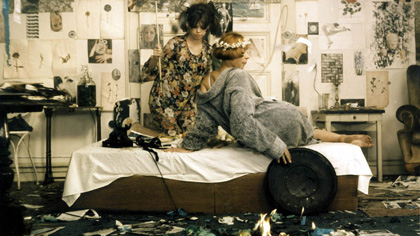
Daises
Ask a film fan what the most exciting films they discovered in 2009 were, and the chances are that their list will include as many old films revived on DVD as new cinema releases. Despite the DVD industry feeling the economic pinch as much as any other, 2009 again saw a great number of unjustly obscure films rescued from history by intrepid distributors, as well as lavish and restored editions of well known classics. And so we polled our contributors and asked them to nominate their five DVD or Blu-ray releases of the year. We didn’t impose restrictive criteria, but instead asked which releases had most impressed or captured the imagination. The full replies are given below.
Individual critics’ nominations:
Gulnara Abikeyeva (Festival programmer and critic, Kazakhstan)
Blindness (Ensaio sobre a cegueira) Fernando Meirelles; 2008; Fox / Region 2
Meirelles’ film sets out the same idea as William Golding’s Lord of the Flies: when society stops acting in accordance with the ethical laws of behaviour, the laws of the wilderness take over. The film lifts the veil from our greatest fear of today – the terror of global epidemic.
Geoff Andrew (Head of film programming, BFI Southbank, UK)
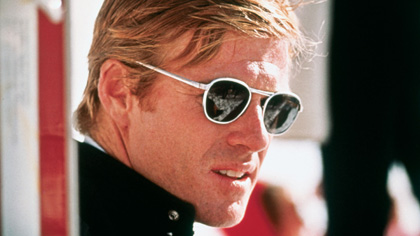
Downhill Racer
Downhill Racer Michael Ritchie; 1969; Criterion / Region 1
The Friends of Eddie Coyle Peter Yates; 1974; Criterion / Region 1
Shirin Abbas Kiarostami; 2008; BFI / Region 2
Michael Atkinson (Critic, USA)
Travels with Hiroshi Shimizu 1933-41; Criterion Eclipse / Region 1
The Sky Crawlers Mamoru Oshii; 2008; Sony / Region 1
Intentions of Murder Shohei Imamura; 1964; on ‘Pigs, Pimps & Prostitutes: 3 Films by Shohei Imamura’; Criterion Eclipse/Region 1
Philippe Garrel x 2: Emergency Kisses + I Can No Longer Hear the Guitar Philippe Garrel; 1989/1991; Zeitgeist Films / Region 1
Los Bastardos Amat Escalante; 2008; Kino / Region 1
James Bell (‘Sight & Sound’)
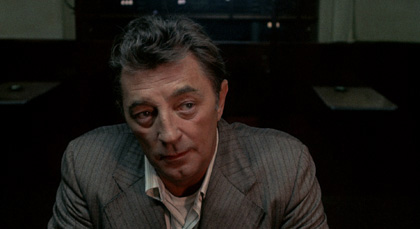
The Friends of Eddie Coyle
Downhill Racer Michael Ritchie; 1969; Criterion / Region 1
The Friends of Eddie Coyle Peter Yates; 1974; Criterion / Region 1
Criterion’s resurrection of two long since neglected, but nonetheless key films of the ‘New Hollywood’ were two personal highlights of the year for me, having never seen either before. The brooding, unhurried neo-noir of Eddie Coyle is brilliantly acted all round, but particularly so by Peter Boyle and a low-key Robert Mitchum. The accompanying booklet deserves a special mention for including an extremely enjoyable on-set New Journalism piece by Grover Lewis written for Rolling Stone in 1973, with Mitchum captured on vintage rascally form. Robert Redford hasn’t been as good in anything before or since Downhill Racer, which could be the most insightful film ever made about the ruthless, competitive world of sports.
Comrades Bill Douglas; 1987; BFI / Region 2
Winstanley Kevin Brownlow; 1975; BFI / Region 2
Two brilliantly realised depictions of life in different periods in British history, with not a palace intrigue or a ripped bodice between them. Bill Douglas’ only feature Comrades details the story of the Tolpuddle martyrs, while Kevin Brownlow and Andrew Mollo’s Winstanley depicts with remarkable authenticity the Diggers attempts to form a commune in Surrey in the mid-Seventeenth century. Fine choices for revival by the BFI.
Nous ne vieillirons pas ensemble (We Won’t Grow Old Together)
Maurice Pialat; 1972; Masters of Cinema / Region 2
Hard to chose between Masters of Cinema’s ongoing series of Maurice Pialat releases (La Guele ouverte and Pas ton bac d’abord were also released this year), but this stark, lacerating, autobiographical film about a mutually destructive, failing relationship, based on a novel by Pialat himself, struck a particular chord. Standing in for the director, Jean Yanne’s warts ’n’ all performance is quite astonishingly brave as he portrays a sometimes cruel, always domineering, but all too believable man. It’s so brutally honest that it’s hard to believe it was such a hit in France when first released.
Lola Montès Max Ophüls; 1955; Second Sight / Region 2
The sumptuous colour and grand sweep of Max Ophuls images were finally done full justice on Second Sight’s disc.
Daisies Vera Chytilová; 1966; Second Run / Region 2
Chytilová’s wildly inventive cult classic of the Czech New Wave. Second Run’s restoration is outstanding, the eye-popping images now as vivid as they should be.
Michael Brooke (Screenonline, BFI National Archive, UK)
BFI Blu-rays Region 2
This comes with the caveat that I contributed to some of the booklets, but if anything that made me even more impressed by BFI DVD Publishing’s balls-out courage in releasing the most unlikely high-definition releases of the year, especially on its new Flipside range. It almost feels wrong watching sixties sleazesploitation like Primitive London in immaculate 35mm-sourced high-definition – surely these films were originally shot on pre-scratched 16mm and trampled in the edit suite?
16mm-sourced Blu-rays
One of the year’s unexpected pleasures was the realisation that 16mm-sourced Blu-rays (as seen on the BFI’s Jeff Keen and Kenneth Anger discs, and Masters of Cinema’s Soul Power and For All Mankind) offer a home viewing experience unlike any other. Virtually all the information on the celluloid can be captured on high-definition, and the highly visible grain structure gives it a filmic ‘feel’ that’s uncannily convincing. The same is even more true of Jeff Keen’s split-screen Super 8 work.
Alan Bennett at the BBC 1978-92; 2Entertain / Region 2
With nine complete plays (including unimpeachably major work like the Stephen Frears-directed A Day Out and Sunset Across the Bay, John Schlesinger’s An Englishman Abroad / A Question of Attribution diptych and the early Daniel Day Lewis vehicle The Insurance Man), two documentaries, and Bennett contributing a lengthy new interview and introductions to each individual piece, this would be a bargain at more than double the online price. As it is, it’s an absolute steal.
Ashes of Time Redux Wong Kar-wai; 1994; Artificial Eye / Region 2
Wong Kar-Wai’s much-abused martial arts epic used to have the unenviable distinction of occupying unarguably the worst (World Video) and close to the second-worst (Mei Ah) DVDs in my entire collection. A decade on, Artificial Eye finally did the film justice, in particular giving Chris Doyle’s images a sheen they hadn’t enjoyed since the premiere. The re-edited ‘redux’ version is still borderline incomprehensible, but Wong and Doyle are dreaming with their eyes open.
Maurice Pialat series 1969-85; Masters of Cinema / Region 2
This began in 2008 and will end in 2010, but the bulk of Masters of Cinema’s Maurice Pialat survey appeared in 2009, and must constitute one of the greatest labours of love conducted by any label in recent years – somewhat ironically, as the notoriously curmudgeonly Pialat would doubtless have bridled at the notion. Top-notch transfers, crammed discs (including numerous short films) and lengthy scholarly booklets add up to a model of DVD presentation.
Tom Charity (Lovefilm and CNN.com, Canada)
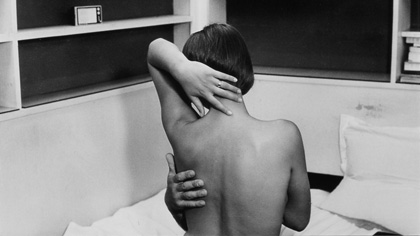
Une femme mariée
La Gueule Ouverte Maurice Pialat; 1974; Masters of Cinema / Region 2
Une femme mariée Jean-Luc Godard; 1964; Masters of Cinema / Region 2
Columbia Pictures Film Noir Classic I (The Sniper, The Big Heat, 5 Against the House, The Lineup, Murder By Contract) 1952-58; Sony / Region 1
Treasures IV: American Avant-Garde Film; 1947-1986 Image Entertainment / Region 0
The Taking of Power by Louis XIV Roberto Rossellini; 1966; Criterion / Region 1 and Roberto Rossellini’s History Films – Renaissance and Enlightenment 1972-74; Criterion Eclipse / Region 1
Ian Christie (Professor of film history, Birkbeck, UK)
The Life Story of David Lloyd George Maurice Elvey; 1919; National Library of Wales / Region 2. With new score by Neil Brand
Nerves (Nerven) Robert Reinert; 1919; Munich Filmmuseum / Region 0
By amazing coincidence, two ‘lost’ films from 1919 appeared on DVD during this past year. Elvey’s biopic of the Welsh Wizard has been known to exist for some 15 years, after its discovery in the subject’s grandson’s attic, but has taken a long time to reach DVD. Enhanced by Brand’s evocative score, it’s been worth the wait, and can still awaze with its recreation of a riot engulfing Birmingham Town Hall and Lloyd-George being attacked by suffragettes. How might the course of British cinema have been seen if this hadn’t mysteriously been withdrawn on the eve of release? Sadly, this new edition seems to be hard to get already.
Reinert’s film is no less astonishing, and was also discovered in the proverbial attic some years ago, before being shown at the Pordenone Silents festival to general amazement. Filmed in Munich during the years when riots swept the city and Germany teetered on the edge of revolution, Reinert shows two extremist politicians facing each other – in a premonition of Germany’s future that’s chilling. The Munich Filmmuseum has followed its restoration with a splendid DVD version, complete with illustrated booklet, contextual films of the period and a fine piano accompaniment.
The Red Shoes Powell & Pressburger; 1948; ITV DVD / Region 2
The two-disc ITV version of Powell and Pressburger’s resurgent classic benefits from the recent digital restoration lead by Scorcese’s Film Foundation, and is truly sumptuous. You still need to see it on a big screen, either in 35mm or digital to appreciate fully the depth and quality of the restoration, but the DVD is a fine record of it.
Diary for My Children Marta Mezaros; 1982; Second Run / Region 2
Second Run continue their fine series of important films that are in danger of being forgotten, or never known, until they appear on DVD. Mezaros’s semi-autobiographical account of growing up in post-World War 2 Hungary is absorbing and deeply-felt, and chimes well with the tide of revelation about Communist-era Eastern Europe in contemporary film-making.
Kieron Corless (‘Sight & Sound’)
Herostratus Don Levy; 1967; BFI / Region 2
Another great resurrection by BFI DVD, along with Jane Arden’s films.
Blood (O Sangue) Pedro Costa; 1989; Second Run / Region 2
Il mondo perduto (The Lost World) – The Short Films of Vittorio De Seta 1954-59; Feltrinelli Real
Roberto Rossellini’s History Films – Renaissance and Enlightenment 1972-74; Criterion Eclipse / Region 1
Maurice Pialat series 1969-85; Masters of Cinema / Region 2
Hami Dabashi (Columbia University, New York, USA)
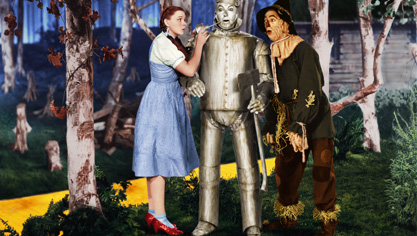
The Wizard of Oz
The Wizard of Oz 70th Anniversary Edition Victor Fleming; 1939; Warner / Region 1 Blu-ray
The all-new digital restoration of this singularly American fairytale – on the occasion of its 70th anniversary – put Blu-ray technology to effective use. And the subtext is as rich as ever, with the useless intellectual (the Wizard of Oz) disabusing heartless industrialisation (the Tin Man), brainless peasantry (the Scarecrow) and the fearful populace (the Cowardly Lion), while common-sense American pragmatism (Dorothy Gale) navigates a middle ground among them – all taking place in the context of the class conflict and cultural warfare of the Great Depression.
Maria M. Delgado (Academic and critic, UK)
Orphée Jean Cocteau; 1950; BFI / Region 2
Cocteau’s reflection on death, German occupation and the Orpheus myth still looks sumptuously gorgeous after all these years. As if digital restoration is not enough in itself, the BFI DVD features tantalising extras, including useful readings of the film by Ginette Vicendeau and Roland-François Lack.
The Essential Michael Haneke 1989-2007; Artificial Eye / Region 2
Haneke’s films reward repeated viewings and this is the perfect way to place new release The White Ribbon in a varied, rich and constantly surprising body of work. Gems include the unreleased The Castle as well as a useful doc on Haneke.
Mid-August Lunch Gianni di Gregorio; 2008; Artificial Eye / Region 2
One of those films whose look and storyline don’t make you think you’re getting second-best on DVD. Set in an August bank holiday somehow it makes for perfect Christmas viewing.
The Wizard of Oz 70th Anniversary Edition Victor Fleming; 1939; Warner / Region 1
Forget catching it on TV this Christmas, this Blu-ray edition is just gorgeous, good enough to eat. Lots of extras but none live up to the film itself.
Die Stille vor Bach (The Silence Before Bach) Pere Portabella; 2007; Sherlock Home Video / Region 2
Catalan avant-garde film-maker Portabella’s witty, inventive homage to Bach avoids all clichés that regularly litter composer biopics; the result is invigorating (both visually and aurally). Some extras give a useful point of entry to the aesthetic, practices and processes of one of Spain’s most eclectic directors.
Andrea Dittgen (Critic, Germany)
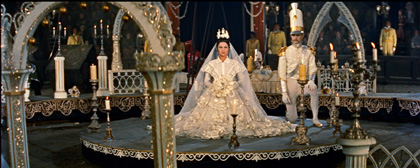
Lola Montès
The Invisible Frame Cynthia Beatt; 2009; 451 / Region 0
In 2009 Tilda Swinton rides a bike following the trail of no longer existing Berlin Wall. She already did the same in 1988 in Cycling the Frame, also by Beatt, when the Wall often stopped her trip. The fascinating documentary with voiceover also shows the talents of Tilda, the poet.
Wim Wenders’ Documentaries 1979-96; Axiom / Region 2
Hearing Wenders’ voice when he talks about Japanese director Yasujiro Ozu in a very smooth way in Tokyo-Ga (1985) makes you love Ozu even you haven’t seen one of his masterpieces. The portrait of Nicholas Ray dying in Nick’s Film – Lightning over Water (1980) and some funny answers by Godard, Herzog and Spielberg in Room 666 interviewed about the future of cinema in 1982 show how passion for cinema never can fade away.
Lotte Reiniger – The Fairy Tale Films Reiniger; 1922-57; BFI / Region 2
There was no lovelier princess than the one German director Reiniger (1899–1981) cut out of a piece of black paper and brought to live in The Adventures of Prince Achmed (1922). The one and only master of the silhouette animation created a unique world of forgotten elegance and fantasy in her coloured short and featured fairy tales. See also the documentary and the interview with Mike Figgis.
Lola Montès Max Ophüls; 1955; Second Sight / Region 2
The only filmy by German director Ophüls in colour and CinemaScope also is a thrilling experience in camera work and storytelling. Lola Montès, the courtesan, reports her life in flashback, presented like a precious animal in a circus. Beautifully reconstructed it’s a great lesson of both, European classic cinema and digital restoration as well. DVD comes along with a making of the restoration.
The Ferroni Brigade aka Christoph Huber & Olaf Moller (Critics, Austria/Germany)
Roberto Rossellini’s History Films – Renaissance and Enlightenment 1972-74; Criterion Eclipse / Region 1
Fundamental.
The Way of a Gaucho Jacques Tourneur; 1952; Fox Spain / Region 2
Finally.
Klaus Wyborny: Das Gesamtwerk (DVD-Edition of Klaus Wyborny’s films and videos); 22 DVDs “at present”; Typee-Verlag / Region 0
The neglected German master’s complete œuvre is now available via his homepage.
Philip French (Critic, ‘The Observer’)
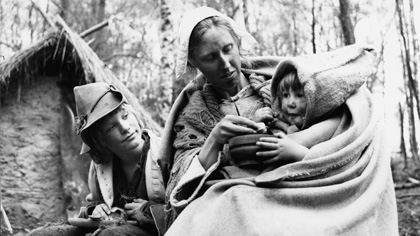
Winstanley
Five important DVDs:
L’Argent Marcel L’Herbier; 1928; Masters of Cinema / Region 2
The great cinéaste L’Herbier’s three-hour silent masterpiece, an updating of Zola’s 1891 novel about buccaneering bankers and laissez faire capitalism, was made on the eve of the Wall Street Crash and now has a frighteningly new relevance. It’s accompanied by one of the earliest ‘Making-of’ documentaries.
Odds Against Tomorrow Robert Wise; 1959; Optimum / Region 2)
This excellent thriller by the undervalued Wise was much admired by J-P Melville who allegedly saw it 124 times. We can now say that the classic era of film noir was from The Stranger on the Third Floor to Odds Against Tomorrow.
Muriel ou le temps d’un retour Alain Resnais; 1963; Masters of Cinema / Region 2
This may be Resnais’s greatest dissertation on his recurrent themes of time, memory, guilt and the elusive past. What seemed obscure 45 years ago now appears lucid, though never obvious.
Winstanley Kevin Brownlow and Andrew Mollo; 1975; BFI / Region 2
Brownlow and Mollo’s great movie about a short-lived idealistic commune in Cromwell’s England is the most revealing film about Britain and the 1960s revolution. That neither directed another feature after It Happened Here and Winstanley is one of the major tragedies of British cinema.
Lola Montès Max Ophüls; 1955; Second Sight / Region 2
Ophüls’ flawed swan-song, here handsomely restored, is not quite as good as the three magnificent costume films that preceded it. But the innovative use of colour, the widescreen and a hypnotically fluid camera is breathtaking. And Peter Ustinov gives his finest screen performance.
Charlotte Garson (‘Cahiers du cinéma’, France)
Il mondo perduto (The Lost World) – The Short Films of Vittorio De Seta 1954-59; Feltrinelli Real / Region 0
The first ten films made by De Seta (sometimes in CinemaScope) during the 1950s are also his best: short colour documentaries, unencumbered by dialogue or voiceover, about Italy’s ‘forgotten people’ – fishermen, shepherds and so on – such as I dimenticati (1959). As restored by Bolonga’s Cineteca, these shorts are valuable not only as historical documents, but also for their formal audacity in sound, camera angles and sometimes Soviet-style montage. The film-maker’s athletic mobility is a world away from affected folkloric celebrations.
The Exiles Kent Mackenzie; 1961; Milestone / Region 1
Never has Los Angeles looked more like a village than in this wonderfully shot semi-documentary following a night in the life of two Native American friends wandering from bar to bar, whilst the wife of one of them goes to the cinema alone (and sees a western…). Neither sordid nor patronising, the film lets its characters do the talking, hence the engaging use of a hypnotic voice over.
La Pudeur ou l’Impudeur (Modesty or Shame) Hervé Guibert; 1991; BQHL editions / Region 2
“Every day, I lose a movement.” In 1991, Hervé Guibert, writer and film critic who narrowly failed the entrance exam of l’Idhec (the most prestigious French film school), filmed the last year of his life in a series of unforgettable long takes. Much more than the diary of a young man dying of AIDS, the film shows an artist as dedicated in trying to give shape to his daily life as he is at executing every morning the few physical exercises he can still perform. A pioneer of digital auto-fiction.
The Little Fugitive Ray Ashley, Morris Engel & Ruth Orkin; 1953; Sony / Region 2
The missing link between US postwar photography and French New Wave. Among other extras, this French edition contains two interesting shorts, Lovers and Lollipops and Weddings and Babies.
Douglas Sirk, Les mélodrames allemands 1935-37; Carlotta / Region 2
Carlotta’s persistence is remarkable: after igniting the rediscovery of Sirk’s Hollywood melodramas in France, along with some of his comedies and even a Western, the DVD distributor has now released ‘Deflef Sierck’, a look at the times when he was under contract with UFA studios. This box set stands out for the inclusion of the superb The Girl from the Marsh Croff, based on a story by Selma Lagerlöf, already filmed by Victor Sjöström in 1917.
Carmen Gray (Critic, UK)
Three DVD releases particularly stood out for me this year:
Hustler White Bruce LaBruce; 1996;
Heavily indebted to Warhol but noteworthy in its own right, the savvy Canadian provocateur’s low-budget cult classic is riotously funny, while valiantly stomping out turf freed from the straight, bourgeois myth of sexual ‘normality’.
Daisies Vera Chytilová; 1966; Second Run / Region 2
This Czech New Wave film is truly unique, both in its formal experimentation and the joyously giggly, heady nature of its anarchic attack on the gender and political strictures of the time. This release sees its colours revivified.
The Legend of Suram Fortress Sergei Paradjanov; 1984; Artificial Eye / Region 2
Another strikingly unique Soviet-era gem, this time from Georgia. It amazes with its odd, visually arresting tableaux and supernatural themes, its folk elements infused with Russian-style mysticism. As if that wasn’t enough, this Artificial Eye release offers a double dose of the auteur, also including his Ashik Kerib.
Peter Hames (Academic and critic, UK)
Daisies Vera Chytilová; 1966; Second Run / Region 2
Rereleased on a customarily pristine DVD by Second Run, Chytilová’s uniquely iconoclastic farce continues to find and surprise new audiences. Avant-garde, feminist, comic, unpredictable – and irreplaceable.
Kent Jones (‘Film Comment’, Lincoln Center, USA)
Il mondo perduto (The Lost World) – The Short Films of Vittorio De Seta 1954-59; Feltrinelli Real / Region 0
There were, as always, numerous highlights and milestones in the DVD/Blu-ray category – Masters of Cinema’s Mabuse box, for instance, or ITV’s Blu-ray of the glorious Red Shoes restoration, or the BFI’s Kenneth Anger Blu-ray. And I am not the only person who was thrilled to see The Friends of Eddie Coyle finally available on DVD, along with a beautiful new edition of Whit Stillman’s Last Days of Disco, both from Criterion (in the interests of full disclosure, I will admit that I wrote the notes for the former, but I would have been just as excited no matter who wrote them).
However, for me the most exciting DVD release of the year came from our restoration partners at The World Cinema Foundation, the Cineteca Bologna. I had first heard about Vittorio de Seta’s short colour documentaries years ago from my friend Hans Hurch in Vienna. When I finally saw them, they were not only as great as I’d heard they were even better. Bologna has issued them in a package appropriately entitled ‘Il Mondo Perduto’. These ten films, made between 1954 and 1959, offers a passionately observant, meticulously shot and constructed record of a pre-modern world gone by, of Sicilian fishermen or the shepherds of Orgosolo. These are precious films, and each and every one is a thriller.
Philip Kemp (Critic, UK)
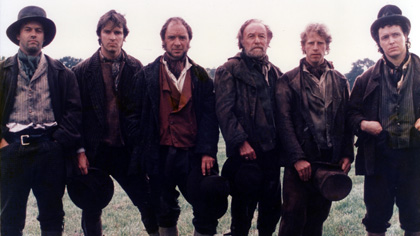
Comrades
The Saragossa Manuscript Wojciech Has; 1965; Mr Bongo / Region 2
Chinese-box cinema at its most intricately playful.
The Queen of Spades Thorold Dickinson; 1950; Optimum / Region 2)
Full-blooded, stylishly macabre fantasy from the forgotten man of British cinema.
Comrades Bill Douglas; 1987; BFI / Region 2
Wide-screen, wide-ranging epic celebrating working-class solidarity. Passionate and compassionate movie-making.
Die Finanzen des Grossherzogs (The Finances of the Archduke) F.W. Murnau; 1924; Masters of Cinema / Region 2
Murnau makes comic-opera farce. Who’d have thought it?
Lotte Reiniger – The Fairy Tale Films Reiniger 1922-57; BFI / Region 2
Sheer enchantment from the undisputed queen of silhouette animation.
Derek Malcolm (‘Evening Standard’, UK)
Little Dorrit Christine Edzard; 1987; SQFD / Region 0
The best Dickens adaptation since Lean’s Great Expectations, superbly played throughout, and much underrated.
Adrian Martin (Critic, Australia)
Maurice Pialat series 1969-85; Masters of Cinema / Region 2
Dusan Makavejev: Free Radical 1965-68; Criterion Eclipse / Region 1
Blood (O Sangue) Pedro Costa; 1989; Second Run / Region 2
The Seashell and the Clergyman Germaine Dulac; 1927; Light Cone/Paris Experimental / Region 0
Sophie Mayer (Academic, UK)
Divorce Iranian Style and Runaway Kim Longinotto; 1998 / 2001; Second Run / Region 2
Still resonant and timely a decade after they were made, Longinotto’s landmark documentaries critically illuminate life for women and girls inside Iran – at exactly the moment such illumination is most needed.
Here Come the Girls various directors; 2007; Peccadillo Pictures / Region 2)
Not only a celebration of short films, but of established and emerging lesbian directors, including two stand-out films from Brits Inge Campbell Blackman (Fem) and Abbé Robinson (Private Life).
The Other Side of the Underneath Jane Arden; 1972; BFI / Region 2, DVD and Blu-ray)
I’m glad I own this film on DVD because it’s hard to believe it’s real: not only were the original prints of this film from the outrageous imagination of one of Britain’s first female feature directors thought to be lost, but the film – inspired by Laingian psychoanalysis and radical feminist theatre – throws the reality of both our outer and inner worlds into question. Outrageously brilliant film — and brilliant detective and restoration work from the BFI to bring it back into circulation.
Henry K. Miller (Academic, UK)
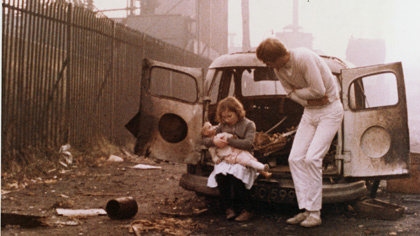
Herostratus
Winstanley Kevin Brownlow; 1975; BFI / Region 1)
Boasts one of the all-time great cover puff-quotes, from Christopher
Hill, doyen of Civil War historians. “This film”, he wrote in Past
and Present on its release in 1975, “can tell us more about ordinary
people in seventeenth-century England than a score of textbooks.”
Dollhouse 2009; Fox / Region 2
In the tradition of Feuillade, Hitchcock (Vertigo meets North by
Northwest), Demonlover and Alias. It’s a shame that Fox has
cancelled it.
In the Loop Armando Iannucci; 2009; Optimum / Region 2
Amazing deleted scenes, featuring the rules of Neutral Club.
Herostratus Don Levy; 1967; BFI / Region 2
For the liner notes.
Mad Men season 2 2008; Lionsgate / Region 2) and Damages season 2 2008; Columbia TriStar / Region 2
Two post-Sopranos series. Mad Men is the best thing since Tony got whacked (or not); Damages is superb entertainment.
Kim Newman (Critic, UK)
The Budd Boetticher Box Set 1957-60; Sony / Region 1
I find Budd Boetticher’s Randolph Scott Westerns – the five included here are The Tall T, Buchanan Rides Alone, Comanche Station, Decision at Sundown and Ride Lonesome – endlessly rewatchable. With a mix of melodrama and melancholy, each trails a haunted hero through a landscape; an enigma to lesser mortals, he is inevitably set against a genial villain who could under other circumstances be his only friend.
Tony Rayns (Critic, UK)
Kim Ki-young Collection 1963-75; Taewon Entertainment / Region 3
Unaccountably missing from the ‘Wild Bunch’ feature (S&S, September), Kim Ki-young (1919-1998) was a committedly noir director with a taste for the libidinous and grotesque who tackled the distortions and calamities of Korean society in inventive ways which resonate even more powerfully now than they must have done at the time. Fully subtitled, this invaluable box set from the Korean Film Archive includes four astonishing features: the incomplete Goryeojang (1963); The Insect Woman (1972); Promise of the Flesh (1975); and Ieodo (1977).
Tim Robey (‘Daily Telegraph’, UK)
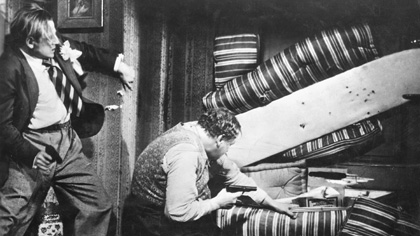
The Dr. Mabuse boxset
The Dr. Mabuse Box-set Fritz Lang; 1922-60; Masters of Cinema / Region 2
Phantom + Die Finanzen des Grossherzogs (The Finances of the Archduke) F.W. Murnau; 1922-24; Masters of Cinema / Region 2
Junebug Phil Morrison; 2005; Masters of Cinema / Region 2 Blu-ray
Nick Roddick (Critic, UK)
The Saragossa Manuscript Wojciech Has; 1965, Poland; Mr Bongo / Region 2
Rediscovery of the year has to be Mr Bongo’s rerelease of Wojciech Has’ 1965 masterpiece, one of the most assured, playful, disturbing, revolutionary, unique and (let’s be honest) mind-blowing three hours of film ever made. Diehard fans include Buñuel, Coppola, Scorsese, Lynch, Jerry Garcia (late of the Grateful Dead)… and me.
Jonathan Romney (‘Independent on Sunday’, UK)
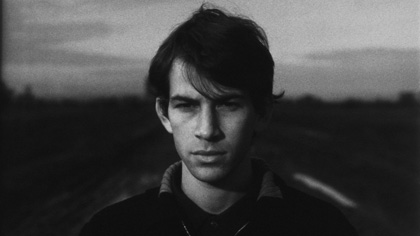
Blood
Blood (O Sangue) Pedro Costa; 1989; Second Run / Region 2
The ‘real’ Costa may be the austere, architectural director of Colossal Youth, but it was a pleasure to rediscover the earlier, baroque stylings of his debut. Costa has become a master but – as when von Trier rejected the game-playing of Europa – you can’t help feeling something was lost in his abandoning of noir-ish fancy.
Jonathan Rosenbaum (Critic, USA)
For their (and, consequently, my) priceless rediscoveries, five treasures from five separate countries:
Avant-Garde 1927-1937 Cinémathèque Royale / Region 0
Two discs & book, both in Dutch, English & French, from Belgium.
Gaumont: Le Cinéma Premier 1897-1913, Volume 1: Alice Guy, Louis Feuillade, Léonce Perret Gaumont / Region 2)
Seven discs & book, both in French), from France.
Joris Ivens Collection 1912-1988 European Foundation / Region 2)
Five discs in Dutch & English, book in Dutch, from the Netherlands.
Blood (O Sangue) Pedro Costa; 1989; Second Run / Region 2
One disc in Portuguese & English, booklet in English from the U.K.
Travels with Hiroshi Shimizu 1933-1941; Criterion Eclipse / Region 1
Four discs in Japanese & English, from the U.S.
Sukhdev Sandhu (‘Daily Telegraph’, UK)
REWIND + PLAY: An Anthology of Early British Video Art 1972-82; Lux / Region 0
Kudos to the BFI for their great reissue programme this year (Herostratus, The Joy of Sex Education, the Jeff Keen and Jane Arden/Jack Bond sets), but the most radical archaeology of avant Albion was Lux’s three-DVD collection of experimental and conceptual video-art created between 1971 to 1982 – films whose unity of formal, political and aesthetic ambition make them as thrilling to watch as they are historically important today.
Handmade Nation: The Rise of DIY, Art, Craft and Design Faythe Levine; 2009; Indiecraftdocumentary / Region 0
Natty, charming and inspiring – very much like the world on which it shines a valuable spotlight – this chronicles the burgeoning eco-, handstitched and micro-boutique scene across the USA that represents a valuable alternative to the mollified mono-culturalism of so much American retailing practice.
Between Truth and Fiction, The Films of Vivienne Dick 1979-2004; Lux / Region 0
The most exciting of the late-70s/ early-80s No Wave directors (but, as this terrifically packaged DVD/ book compilation shows, so much more than that too), this is a great tribute to a too little-known margin-trespasser.
Daisies Vera Chytilová; 1966; Second Run / Region 2
Finally! Classic Czech New Wave mash-up of pop-art absurdism, social surrealism and riot-grrl expressionism gets the loving Second Run treatment.
Personally Speaking: Colin Ward In Conversation With Roger Deakin Mike Dibb; 2009; Image Creative & Dibb / Region 0
Simple, yet essential: wry, passionate, free-ranging and always-engaging 155-minute conversation between Britain’s foremost anarchist-philosopher and the naturalist author of Waterlog.
The London Nobody Knows Norman Cohen; Optimum / Region 2
Whimsical, melancholic, avant-antiquarian: this 1967 oddity, championed for many years by the band Saint Etienne who used it as a partial template for their feature Finisterre, is finally liberated from the archival noose. It’s paired with Les Bicyclettes de Belsize, a Londonist spin on a Jacques Demy musical.
Anna Smith (Critic, UK)
In the Loop Armando Iannucci; 2009; Optimum / Region 2
Brilliantly British crowd-pleaser and a perfect fit for DVD
Cherry Blossoms – Poignant meditation on family, friendship and loss
Paul Julian Smith (Cambridge University, UK)
Mad Men season 2 2008; Lionsgate / Region 2; and season 3 online
The most subtle, complex and gorgeous-looking depiction of recent US history on screen.
Fernanda Solorzano (Critic, Mexico)
The Exterminating Angel Luis Buñuel; 1962, Mexico) (Criterion/Region 1
As surreal as its premise – the guests at a dinner party are, for some reason, unable to leave the house – is the fact that Buñuel’s Mexican masterpiece has never been available to Mexican DVD buyers. The Criterion release will still be a pricey option, but better than the bizarre unavailability of the film.
Kate Stables (Critic, UK)
The Spy Who Came in From the Cold Martin Ritt; 1965; Criterion / Region 1
Martin Ritt’s mournful, gorgeously monochrome classic thriller, packaged with superbly intelligent extras. The Berlin Wall never looked better, and neither did Richard Burton’s world-weary theatricality.
We Live In Two Worlds: GPO Film Collection Volume 2; 1936–1938 BFI / Region 2
A bulging, delicious variety pack of Cavalcanti’s finest directors of the Thirties: Len Lye, Norman McLaren, Lottie Reiniger, the gang’s all here. Not to mention the Night Mail crossing the border, bringing the cheque and the postal order…
Helen Christine Molloy & Joe Lawlor; 2008; New Wave Films / Region 2
Desperate Optimists Molloy and Lawlor bring their elegant single-take shots, unnervingly affectless community cast, and rigorously understated story to the police procedural, reworking the who-dunnit as a dreamily personal mystery.
Brad Stevens (Critic, UK)
Transe (Trance) Teresa Villaverde; 2006; Atalanta Filmes / Region 2
Another sparsely distributed work, currently only viewable in the form of an English-subtitled DVD released in Portugal by Atalanta Filmes. The best of the recent group of films about human trafficking, this masterpiece confirms Villaverde’s standing as one of modern cinema’s most important figures.
Philippe Garrel x 2: Emergency Kisses + I Can No Longer Hear the Guitar Philippe Garrel; 1989/1991; Zeitgeist Films / Region 1
Garrel is shamefully under-represented on DVD, so this two-disc set, including the Cinema, de notre temps episode ‘Philippe Garrel, artiste’ (1998), is especially welcome.
Daisies Vera Chytilová; 1966; Second Run / Region 2
Second Run continues to be one of the most adventurous DVD distributors in the UK (or anywhere else). Věra Chytilová’s 1966 film, accompanied by a generous selection of extras, is among the finest of their recent releases.
A Time to Love and a Time to Die Douglas Sirk; 1958; Masters of Cinema / Region 2
It would be easy enough to make a list of 2009’s top five DVDs that included nothing but Masters of Cinema titles. My (somewhat arbitrary) choice is this Sirk rarity, available in a two-disc set that includes an excellent documentary on the director.
Husbands John Cassavetes; 1970; Columbia Pictures / Region 1
This Cassavetes film finally makes its home viewing debut in a definitive edition that combines all the footage from the various previously circulating versions.
Jeanne Dielman, 23 quai du Commerce, 1080 Bruxelles Chantal Akermen; 1975; Criterion / Region 1
Another long-awaited release (and perhaps something of an answer to Husbands), Akerman’s 1975 ‘epic’ has been given the full Criterion treatment, with a disc of extras that includes the director’s wonderful debut short, Saute ma ville.
Amy Taubin (Critic, USA)
Diaries, Notes and Sketches (Walden) Jonas Mekas; 1969; Microcinema / Region 0
When people ask what it was like to live through the 1960s, I send them to Mekas’ diaristic masterpiece, an essential downtown/uptown New York cultural history that also embodies the radical transformation of film language by the American avant-garde. The excellent digital restoration preserves the handmade aesthetic of image and sound.
Jeanne Dielman, 23 quai du Commerce, 1080 Bruxelles Chantal Akermen; 1975; Criterion / Region 1
Not only is Akerman’s film mesmerizing on the small screen (something I never expected, given its minimalist style and distanced camera positions) it becomes, in a situation where I can control sound level and balance, as much structured by the rhythm of footsteps as by what is visible in the image.
Catherine Wheatley (Critic, UK)
Chocolat Claire Denis; 1988, France/Germany; Artificial Eye / Region 2
Inspired by the same material as her White Material (her own upbringing and Doris Lessing’s The Grass Is Singing), Denis’ first film is the more atmospheric and thought-provoking work.
See also
The DVDs of 2008 (December 2009)
